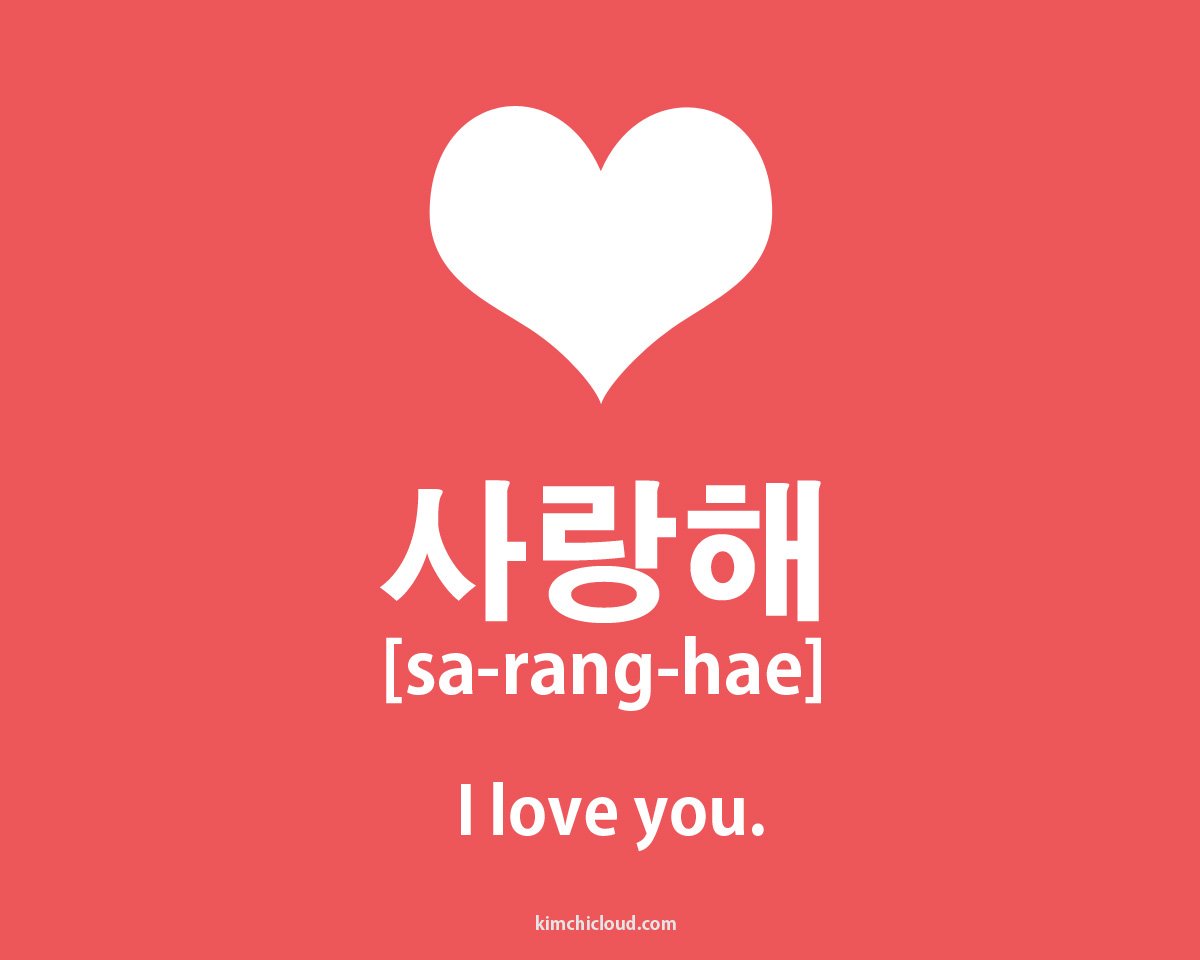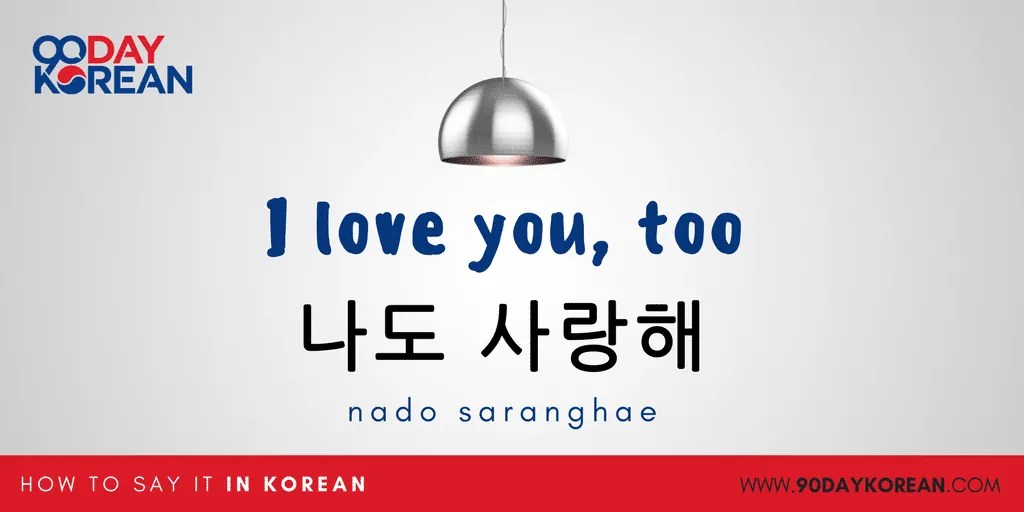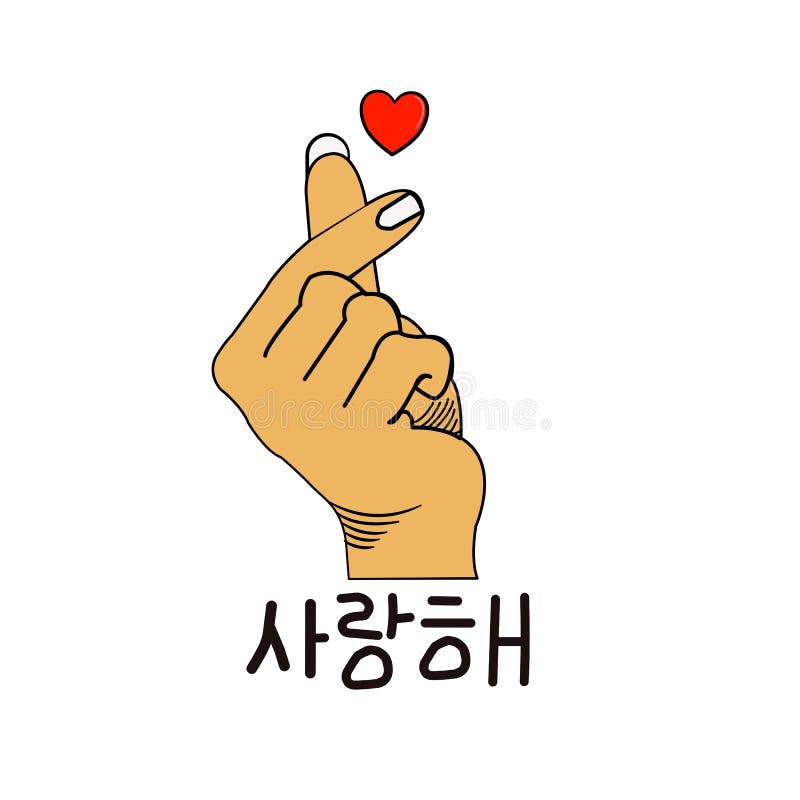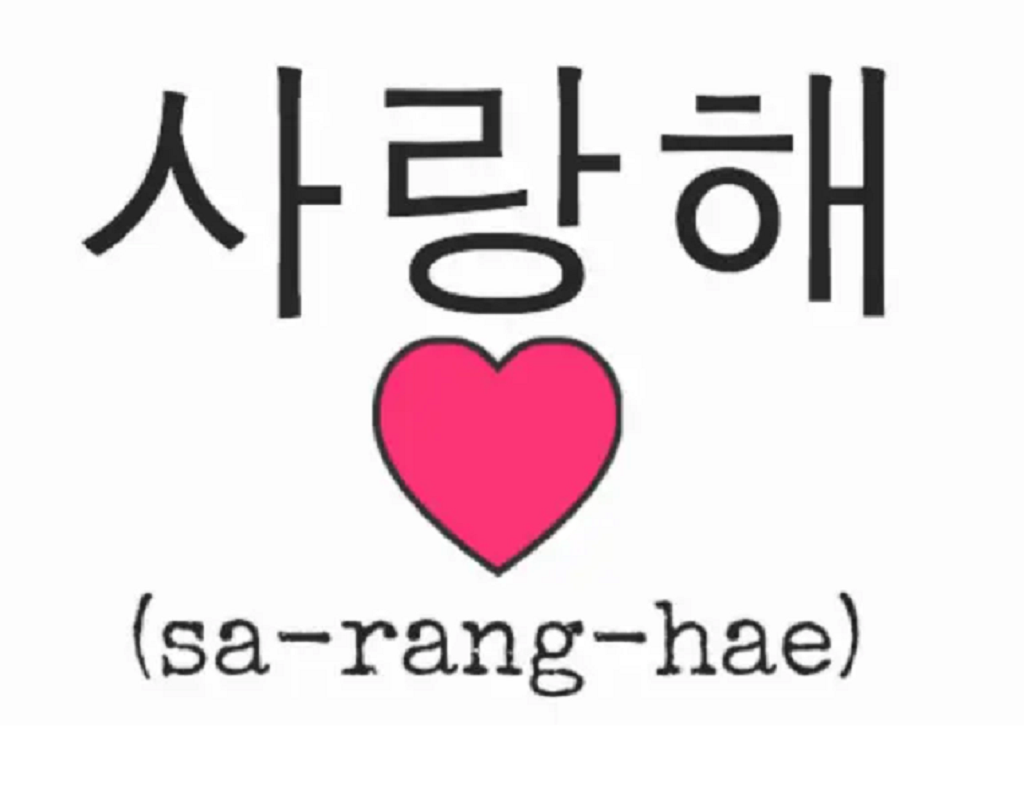
Nado Saranghae Park Jimin Chapter 4 Wattpad
Depending on how someone decides to romanize Korean, you could see a variation of "사랑해요" which includes an "l" instead of an "r". However, the word is always written consistently as "사랑해요" in Korean Hangul. The most common way to say "I love you" in Korean is "사랑해 saranghae" as it is informal.

Apa Arti Saranghae Dalam Bahasa Korea / Kosa Kata Bahasa Korea Bts Army Indonesia Amino Amino
What does 나도 사랑해 (nado salanghae) mean in Korean? English Translation. I love you too. More meanings for 나도 사랑해 (nado salanghae) love you too. 나도 사랑해.

How to write saranghae in korean characters
Saranghae (사랑해) Saranghae is the more informal way of saying " I love you .". It is more commonly used between couples and is mainly used with people you are close to. The polite ending (요 | yo) has been removed from the word. This is what makes it informal. You can also hear it in many K-dramas and movies as it is a common phrase.

Nado Korean 'How to speak in Korean' Teaserㅣ나도 한국어 '한국어 사용법' 티저 YouTube
I love you too in Korean. So, if someone confesses their love by saying "I love you," and you want to reciprocate the feeling, you can say, you can reply with 나도 사랑해 (nado saranghae). It means "I love you, too. Formal. I love you too. 저도 당신을 사랑해요-Jeo-do Dang-shin-eul Sa-rang-hae-yo. Informal.

Nado Saranghae PNG, Vectores, PSD, e Clipart Para Descarga Gratuita Pngtree
나도 사랑해 (nado saranghae) Listen: 나도 사랑해 I love you too. 4) 사랑행 / 사랑해용 (saranghaeng / saranghaeyong) Listen: 사랑해용 Listen: 사랑행 These are the same words as 사랑해 (saranghae) and 사랑해요 (saranghaeyo) with a ㅇ(ng) added to the end. Koreans will often do this at the end of a sentence to add.

Nado Saranghae Jjk Jeon jungkook, Jungkook cute, Jungkook
Saranghaeyo = "I Love You" in Korean - Polite. The polite way to say "I love you" in Korean is 사랑해요 (sa-rang-hae-yo). You have probably noticed that it is the same as the informal way, but with '요' (yo) attached. 요 is the ending added to verbs to change that verb into the polite form.

Nado Saranghae Park Jimin Chapter 32 Wattpad
The reply for it can be '나도 사랑해' nado saranghae which basically means 'I love you too'. '사랑해요' saranghaeyo is used for polite expression whereas '사랑해' saranghae is more of an informal expression. '사랑합니다' saranghamnida is the most formal way for expressing your love. Since we know that.

Saranghae Korean hangul vinyl sticker / korean stickers Etsy
Here are the Korean words that make up the phrase "I love you": 사랑 (sarang) - love. 하다 (hada) - to have or to do. 사랑 (sarang) + 하다 (hada) = 사랑하다 (saranghada) When you add 하다 (hada) to the word 사랑 (sarang), you get the Korean verb 사랑하다 (saranghada). So literally translated, this phrase means "to.

How to write saranghae in korean characters
If you want to use either of these phrases as shorthand, like "I like u" or "I love u" in Korean, then you would just use the short, casual forms: 좋아해! (joahae) or 사랑해 (saranghae). "My Love" in Korean - Nae Sarang To say "my love" in Korean, you just need to add "my" to sarang i.e. 내 사랑 (nae sarang).

Nado Saranghae In Hangul free PNG website
So, if you have been told "I love you," and you want to reciprocate the feeling, you can say, 나도 사랑해 (nado saranghae), which means "I love you too.". 7. 진심으로 사랑해 (Jinsimeuro Saranghae) English translation: I love you with all my heart.

saranghae, love, and korean image Korean image, Learn korean, We heart it
The word Saranghae [사랑해] is informal and is often used to express love between people of the same age, younger or between siblings. It's a bit informal word, its more formal version is SarangHaeYo [사랑해요] used for people with little intimacy. There is a more formal version which is SarangHapnida [사랑합니다] used for older or.

Saranghae Korean for I Love you Square Sticker Zazzle
One-sided love is not easy for some. So, if you have been told "I love you," and you want to reciprocate the feeling, you can say, 나도 사랑해 (nado saranghae), which means "I love you too.". 7. 진심으로 사랑해 (Jinsimeuro Saranghae) Korean Love Words and Phrases | I love you with all my heart.

nado saranghae Seungri, Vip Bigbang, Bigbang G Dragon, Choi Seung Hyun, Ji Yong, Bts And Exo
Now, the informal (and most common) way to say "I love you" in the Korean language is 사랑해 ( saranghae ). 사랑해 ( saranghae) is used between couples, and sometimes even close friends. So if you're already in a relationship, this is the phrase you'd use. And to say "I love you, too" in Korean, you'd say 나도 사랑해.

The Illustration Of Saranghae Handshape Love Symbol In Korean Stock Vector Illustration of
This is a famous phrase among school and college students. 4. 난 영원히 당신을 사랑할 거야! which means I'll love you forever!. This is a creative way of saying I love you in Korean. If you use this phrase your partner becomes so happy. 난 (Nan) 영원히 (Yeong won hi) 당신을 (Dangsineul) 사랑할 거야! (Saranghalkoya) 5.

Searching for the meaning of Saranghae? Here are all the answers and some common Korean
Saranghae means I love you in Korean. So the (hopefully positive!) reply to this would be 나도 사랑해 (nado saranghae) which means "I love you too. If not you can also reply with the word "아니요" (aniyo) which means no. However, be warned this might cause a few hearts to break.

Gambar Saya Sayang Awak Dalam Tulisan Saranghae Korea PNG Kesan Teks PSD Untuk Muat Turun
You could say 나 너 좋아해 (na neo joahae)/널 좋아해 (neol joahae.) Or you can substitute "you" with the listener's name and add 아 or 야 after the. Example. I like you, minji. 민지야, 좋아해 (minjiyah, saranghae.) Note. If a Korean name ends in a consonant, add 아 (ah) to the end of his/her name.